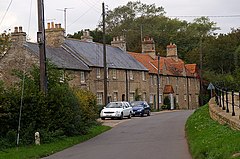Yardley Hastings
| Yardley Hastings | |
|---|---|
 Yardley Hastings |
|
| Yardley Hastings shown within Northamptonshire | |
| Population | 745 (2011) |
| OS grid reference | SP865570 |
| • London | 64 miles (103 km) SE |
| Civil parish |
|
| District | |
| Shire county | |
| Region | |
| Country | England |
| Sovereign state | United Kingdom |
| Post town | NORTHAMPTON |
| Postcode district | NN7 |
| Dialling code | 01604 |
| Police | Northamptonshire |
| Fire | Northamptonshire |
| Ambulance | East Midlands |
| EU Parliament | East Midlands |
| UK Parliament | |
Yardley Hastings is a village and civil parish in the English county of Northamptonshire. It is located south-east of the county town of Northampton and is skirted on its south side by the main A428 road to Bedford.
The affix 'Hastings' is the surname of the Earls of Pembroke of the third creation; it distinguishes the village from nearby Yardley Gobion.
Thomas Dudley was born in Yardley Hastings in 1576. He sailed to New England on the Arbella in 1630 and became Governor of the Massachusetts Bay colony. He signed the charter of Harvard College in 1650.
Bouttoll Downing was born in Yardley Hastings in 1510. Ten generations later in 1820 "his descendant Sarah Downing" married John Abbey in Yardley Hastings where further generations continued to live.
Yardley Hastings is the village in which Marianne Faithfull's character Maggie lives in the 2007 film Irina Palm.
The parish church is dedicated to St Andrew, has a 13th-century west tower and the remains of a Norman wall. It also has exceptional examples of Romanesque detailing.
The former Congregational chapel dates from 1813 and subsequently became home to a congregation of the United Reformed Church. Worship here commenced in 1672 when a licence was granted to John Neale of Yardley Hastings permitting him to use his cottage for the purpose of worship and this represents the first recorded instance of nonconformity in Yardley Hastings. Records of worshipers were initially kept to a minimum since at this time many nonconformists were persecuted and imprisoned, with many in the 17th century emigrating to America where they were able to enjoy freedom of worship. As a result, there appears to be a total absence of early records until a meeting house was erected and the first minister (Doddridge) was ordained in 1730.
...
Wikipedia

